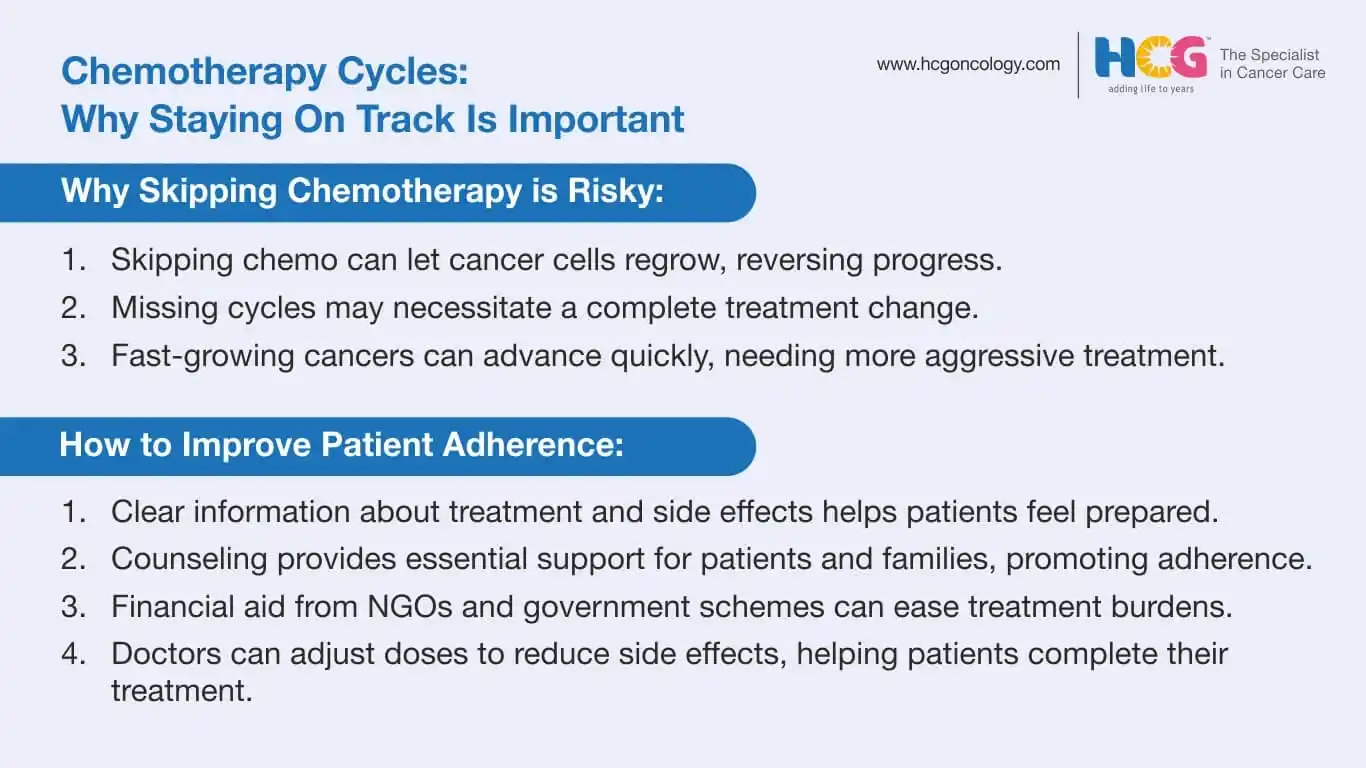
02 Dec, 2025
Feel free to reach out to us.

02 Dec, 2025

This article is medically reviewed by Dr. Sushantkumar Ikhar, Consultant - Medical Oncology, HCG Cancer Centre, Nagpur.
Several treatments are available for cancer. The most common of them are chemotherapy, surgery, and radiation therapy.
Chemotherapy involves the administration of drugs that kill cancer cells. It is given in cycles for optimum efficacy and to recover from side effects.
Treatment adherence is the key to positive outcomes. Therefore, patients should not skip or delay their chemotherapy cycles.
But what do these chemotherapy cycles involve? What are the side effects of chemotherapy? Why do patients tend to skip their chemotherapy sessions? And finally, why should cancer patients ensure they do not miss their chemotherapy cycles?
Read this article till the end to find out your answers.
Patients undergo therapeutic chemotherapy in several cycles or sessions. Usually, patients undergo 4-8 treatment cycles. The duration between one round of therapy and the start of the next is referred to as one cycle.
Usually, chemotherapy is given weekly , 2 weekly or 3 weekly
Medical oncologists consider the following aspects while planning chemotherapy cycles for different types of cancer:
When administered in cycles, therapeutic chemotherapy enhances treatment efficacy and improves outcomes. This is because not all cancer cells divide uncontrollably at a given point. Some are in the resting stage.
Chemotherapy only kills those cells that divide rapidly. Thus, administering the drug in cycles helps kill cancer cells throughout the body more effectively.
Chemotherapy has several side effects. These are nausea, vomiting, fatigue, and a higher risk of infections. Continuous administration of these drugs may cause severe side effects that the body cannot tolerate.
Depending upon the type of cancer, the patient’s age, and other factors, medical oncologists devise customized chemotherapy cycles for patients in such a way that there is sufficient time for the body to recover from the side effects.
Those undergoing chemotherapy may experience various side effects. These side effects may be mild to moderate.
In some cases, however, these side effects can be severe and may need medical attention. Patients may reach out to their expert team for appropriate interventions in such cases. The following are the different side effects associated with chemotherapy:
Fatigue is the most common side effect of chemotherapy, and it can last for several weeks or even months after treatment ends. Patients need to rest often to tackle their tiredness effectively.
Chemo drugs target rapidly dividing cells, including hair follicles, which can lead to partial or complete hair loss. Hair loss due to chemotherapy is usually temporary, with regrowth starting a few months after treatment ends.
In some patients, chemo treatment can cause pain in different parts of the body, such as the mouth, throat, and joints. This pain can be managed through medications.
Chemotherapy drugs can cause damage to cells in the mouth and throat, making them sore and tender, which may lead to swallowing difficulties. Doctors may recommend special mouthwashes and rinses to soothe mouth sores.
Some chemotherapy drugs irritate the lining of the digestive tract and may lead to diarrhea. Chemotherapy-induced diarrhea is temporary and can be managed with medication.
Certain chemotherapy drugs may affect the gut’s nerve supply and cause constipation. With the help of some lifestyle modifications and medications, it is possible to manage this side effect.
Certain chemotherapy drugs activate the chemoreceptor trigger zone (CTZ) in brain, and this may lead to nausea and vomiting in some patients. Both nausea and vomiting are temporary side effects of chemotherapy, and medications can help in their management.
Chemotherapy may affect the functioning of bone marrow in some cases, leading to reduced counts of white blood cells, red blood cells, and platelets in the blood. This may make the patient more susceptible to various blood disorders and infections.
Some patients experience challenges associated with thinking and memory while undergoing chemotherapy. These cognition-related issues are temporary and wear off once the treatment is over.
Patients undergoing chemotherapy may experience fertility issues, and it can also lead to changes in sexual desires and function. In such cases, patients may consider talking to their doctor about their concerns.
During chemotherapy, many patients experience loss of appetite. In such cases, patients may consider having food in small portions frequently. They may also consider consulting with an onco-dietician for nutritional counseling.
Additional Reading: Chemotherapy Side Effects - Tips to Manage them

In some cases, doctors may recommend delaying chemo by two weeks or more, depending on individual case parameters. There are several reasons for patients skipping or delaying their chemotherapy cycles:
Some patients cannot tolerate the side effects of chemotherapy. It may lead to skipping or completely stopping the chemotherapy cycles. If the side effects are severe, the doctor may prescribe medications to help manage them.
That said, today, we have access to advanced chemotherapy drugs that are not only effective in killing cancer cells effectively but also are more patient-friendly, allowing patients to have a more tolerable treatment journey.
When patients encounter an infection or a fever, doctors may delay or pause the chemo treatment. The treatment resumes once the patient recovers from the illness.
In some cases, patients may end up with a low white blood cell count after their chemotherapy cycle. In such cases, doctors may delay the subsequent cycles. Having a very low white blood cell count may increase the risk of infection.
Chemotherapy may cause severe fatigue and weakness. If patients need hospitalization, the doctor may delay the chemotherapy cycle until they are fit to continue the treatment.
Several other issues lead to the skipping or delaying of chemotherapy cycles, and they include financial constraints, family responsibilities, job requirements, and depression and anxiety due to the disease.
Patients should not skip or delay their chemotherapy cycles. If there is any delay or skipping of the dose (especially the oral drugs), the patient should immediately inform the doctor. They should seek advice for a further course of treatment.
Patients should not skip chemotherapy cycles due to the following reasons:
Skipping or delaying the chemotherapy cycles may offset the results obtained with the prior chemotherapy cycles.
As mentioned before, some cells are in the resting stage and may divide after completing the previous cycle. Therefore, the disease may reach the pre-treatment stage if these cells are not killed through the next treatment cycle.
It is essential to note that chemotherapy administration varies for each patient depending on the type and stage of cancer.
When a chemotherapy cycle is skipped, the disease may progress to the next stage, and the oncologists may have to change the complete course of treatment. Eventually, the patient may have to take medicine from the beginning and may also require adjuvant therapy.
In fast-growing cancers, such as inflammatory breast cancer, skipping chemotherapy may cause the disease to quickly progress to an advanced stage. As a result, oncologists may have to prescribe intensive chemotherapy treatment along with surgery or radiation therapy.
Several studies have concluded that skipping or delaying the chemotherapy cycles may reduce the survival rate and increase mortality.
For instance, a study on colon cancer patients revealed that patients who completed chemotherapy have a significant survival advantage, whereas those who did not complete chemotherapy have relatively lower survival rates.
Cancer has a devastating effect on the lives of patients and their family members. Therefore, improving patients' adherence to treatment is essential to improving survival and reducing mortality. Some of the ways to improve patients' adherence are:
The healthcare providers must provide clear information about the treatment to patients, including the type of chemotherapy, its duration, its benefits, and its side effects. It will help patients prepare for their treatment in advance.
Psychological support through counselling is required for both patients and their family members. Studies have found that patients who have a better support system show a higher adherence rate.
Several NGOs collect funds for the treatment of cancer patients. Further, the central and state governments have several schemes to assist cancer patients financially. Therefore, there is a need to create public awareness about such schemes.
The doctor may alter the treatment when patients cannot tolerate the current chemotherapy cycles. It may include lowering the dose of the drugs. It will reduce the side effects and allow patients to complete the chemotherapy cycles.
Chemotherapy works well when patients adhere to the scheduled chemotherapy cycles. Unless in emergency conditions, patients should complete their chemotherapy cycles. Further, healthcare professionals should also look into the reasons that force patients to skip treatment. Psychological support and counseling, if considered, are found to have a positive impact on treatment adherence and completion.

Dr Sushantkumar Ikhar
Consultant - Medical Oncology
MBBS, MD (Medicine), DM (Medical Oncology)
Dr. Sushant Ikhar is a highly experienced medical oncologist who specializes in the treatment of lung, breast, and ovarian cancer. He is available for consultations at HCG Cancer Centre, the best cancer hospital in Nagpur. His approach to treatment is evidence-based and customized to the individual needs of the patient. He is well-versed in chemotherapy, targeted therapy and immunotherapy and makes sure to discuss all the available treatment options with the patient. He also has a special interest in clinical trials related to cancer and keeps himself updated on the latest advances in the field.
Appointment Link: Book an Appointment with Dr. Sushantkumar Ikhar.